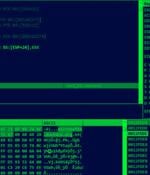Security News

A new and previously undetected malware dubbed 'Lightning Framework' targets Linux systems and can be used to backdoor infected devices using SSH and deploy multiple types of rootkits. Described as a "Swiss Army Knife" in a report published today by Intezer, Lightning Framework is a modular malware that also comes with support for plugins.

ESET researchers discovered CloudMensis, a macOS backdoor that spies on users of compromised Macs and uses public cloud storage services to communicate back and forth with its operators. Outline of how CloudMensis uses cloud storage services.

ESET researchers first spotted the new malware in April 2022 and named it CloudMensis because it uses pCloud, Yandex Disk, and Dropbox public cloud storage services for command-and-control communication. CloudMensis' capabilities clearly show that its operators' main goal is to collect sensitive info from infected Macs through various means.

A newly observed phishing campaign is leveraging the recently disclosed Follina security vulnerability to distribute a previously undocumented backdoor on Windows systems. "Rozena is a backdoor malware that is capable of injecting a remote shell connection back to the attacker's machine," Fortinet FortiGuard Labs researcher Cara Lin said in a report this week.

A sneaky malware for Linux is backdooring devices to steal data and can affect all the processes running on a particular machine, researchers have found. Orbit can either achieve persistence on a machine or be installed as volatile implant, Intezer's Nicole Fishbein explained in a blog post on Orbit published this week.

A newly discovered malware has been put to use in the wild at least since March 2021 to backdoor Microsoft Exchange servers belonging to a wide range of entities worldwide, with infections lingering in 20 organizations as of June 2022. Dubbed SessionManager, the malicious tool masquerades as a module for Internet Information Services, a web server software for Windows systems, after exploiting one of the ProxyLogon flaws within Exchange servers.

Entities located in Afghanistan, Malaysia, and Pakistan are in the crosshairs of an attack campaign that targets unpatched Microsoft Exchange Servers as an initial access vector to deploy the ShadowPad malware. "During the initial attacks, the group exploited an MS Exchange vulnerability to deploy ShadowPad malware and infiltrated building automation systems of one of the victims," the company said.

What makes Symbiote different from other Linux malware that we usually come across, is that it needs to infect other running processes to inflict damage on infected machines. Instead of being a standalone executable file that is run to infect a machine, it is a shared object library that is loaded into all running processes using LD PRELOAD, and parasitically infects the machine.

Cybersecurity researchers have disclosed details of two medium-security flaws in Mitel 6800/6900 desk phones that, if successfully exploited, could allow an attacker to gain root privileges on the devices. Tracked as CVE-2022-29854 and CVE-2022-29855, the access control issues were discovered by German penetration testing firm SySS, following which patches were shipped in May 2022.

The Gallium state-sponsored hacking group has been spotted using a new 'PingPull' remote access trojan against financial institutions and government entities in Europe, Southeast Asia, and Africa. Gallium is believed to originate from China, and its targeting scope of the telecommunications, finance, and government sectors in espionage operations aligns with the country's interests.